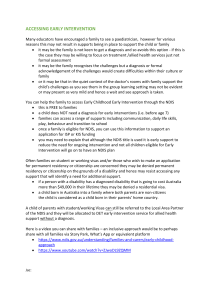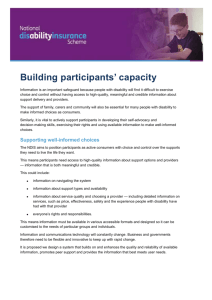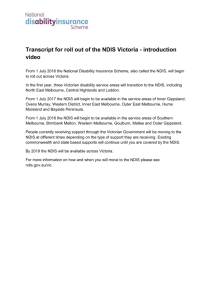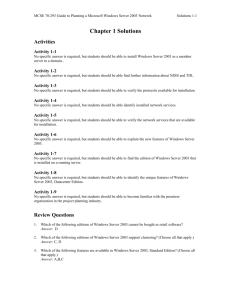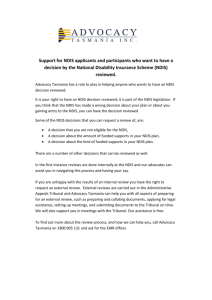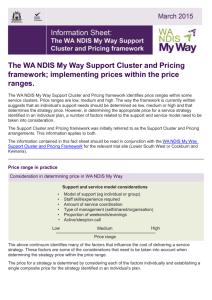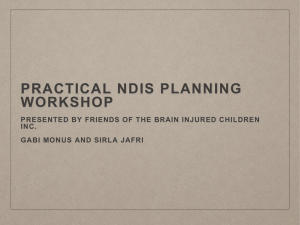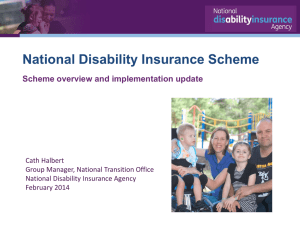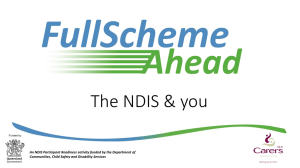WA NDIS My Way: Support Needs Assessment Operational Policy
advertisement
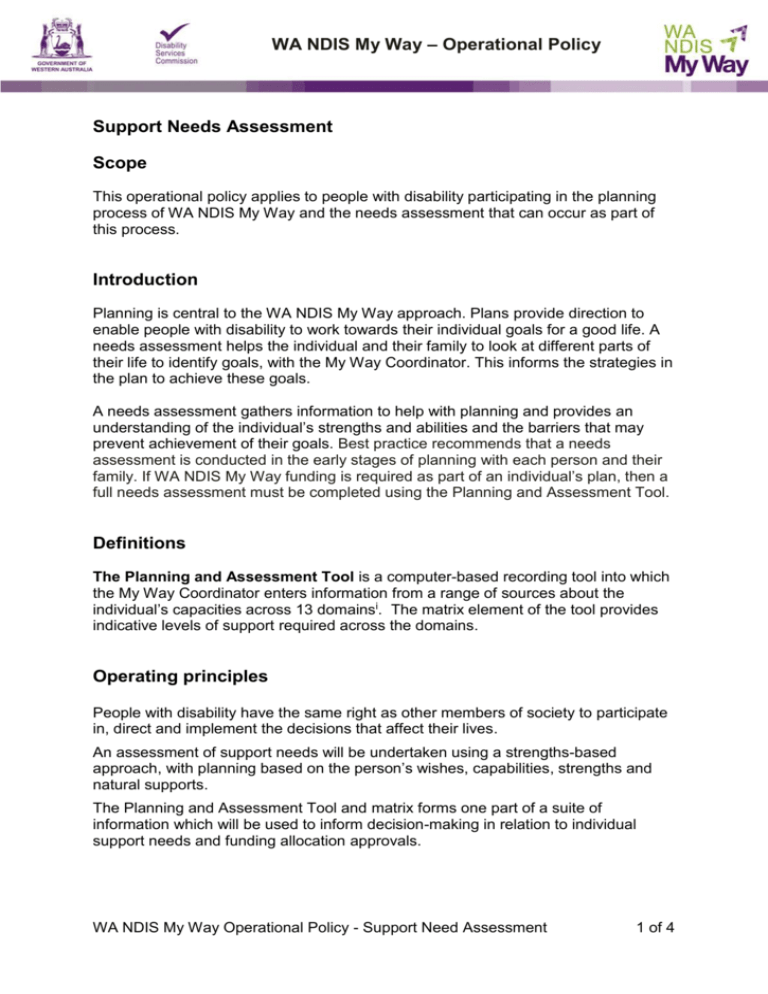
WA NDIS My Way – Operational Policy Support Needs Assessment Scope This operational policy applies to people with disability participating in the planning process of WA NDIS My Way and the needs assessment that can occur as part of this process. Introduction Planning is central to the WA NDIS My Way approach. Plans provide direction to enable people with disability to work towards their individual goals for a good life. A needs assessment helps the individual and their family to look at different parts of their life to identify goals, with the My Way Coordinator. This informs the strategies in the plan to achieve these goals. A needs assessment gathers information to help with planning and provides an understanding of the individual’s strengths and abilities and the barriers that may prevent achievement of their goals. Best practice recommends that a needs assessment is conducted in the early stages of planning with each person and their family. If WA NDIS My Way funding is required as part of an individual’s plan, then a full needs assessment must be completed using the Planning and Assessment Tool. Definitions The Planning and Assessment Tool is a computer-based recording tool into which the My Way Coordinator enters information from a range of sources about the individual’s capacities across 13 domainsi. The matrix element of the tool provides indicative levels of support required across the domains. Operating principles People with disability have the same right as other members of society to participate in, direct and implement the decisions that affect their lives. An assessment of support needs will be undertaken using a strengths-based approach, with planning based on the person’s wishes, capabilities, strengths and natural supports. The Planning and Assessment Tool and matrix forms one part of a suite of information which will be used to inform decision-making in relation to individual support needs and funding allocation approvals. WA NDIS My Way Operational Policy - Support Need Assessment 1 of 4 WA NDIS My Way – Operational Policy Implementation This operational policy will be implemented in WA NDIS My Way trial sites. The information required to complete a needs assessment can mostly be gathered by the My Way Coordinator during conversations with the person, their family or carer rather than necessarily being a defined exercise. The assessment will be conducted in a responsive and non-intrusive way and can be completed over a period of time. My Way Coordinators are expected to use their judgement (drawing upon their skills, experience and expertise) in determining the depth and pace of these discussions, how this information is gathered and the manner of engagement with the person. They will be sensitive to the person’s needs and circumstances. For example, some individuals may find the needs assessment highly beneficial and others find it overly intrusive. The assessment will be of appropriate rigour reflecting a balance between the information an individual is willing to provide, the complexity of presenting needs and level of supports and funding which may be proposed. Information may be sought from a range of other sources, for example existing medical reports, information and assessments. This information can be used to complete the assessment tool. A My Way Coordinator may require assistance to understand the information available and may seek the expertise of other staff and/or professionals. The needs assessment completed at the time of development of the individual’s first plan does not require updating for each subsequent plan. However, it may become evident during planning conversations between the person and the My Way Coordinator that there has been a change in needs and a new needs assessment would contribute to the planning process. Planning and Assessment Tool The Planning and Assessment Tools have been developed for use with adults (aged 18 years and over) and with children (aged 0 to 17 years). The tool evaluates the areas and nature of support needed across 13 domains1. The tool allows a more detailed consideration of need where any one of the domains or core areas of functional capacity is significantly and permanently impaired, and is identified by the person as presenting specific challenges that would need to be addressed to enable them to achieve their goals. The tool covers any difficulties experienced by the person and the impact of their disability in the domains of: WA NDIS My Way Operational Policy - Support Need Assessment 2 of 4 WA NDIS My Way – Operational Policy Learning and applying knowledge, for example understanding and remembering information, learning new things, practicing and using new skills and ideas. General tasks and demands, for example doing daily tasks, managing daily routine, handling problems or making decisions Communication, for example being understood, in their preferred language (spoken, written or sign language), and understanding others (includes difficulties with hearing). Mobility, for example moving around the home, moving about in the community (including using public transport or a motor vehicle), getting in or out of bed or a chair. This includes difficulty due to visual impairment. Self-care and Special Health Care Needs, for example showering/bathing, dressing, eating, toileting, caring for own health or special health care needs. Domestic Life, for example preparing meals, cleaning, housekeeping, shopping, home maintenance or caring for others. Interpersonal Interactions and Relationships, for example making and keeping friends and relationships, behaving within limits accepted by others, coping with feelings and emotions. Community, Social and Civic Life, for example community activities, recreation and leisure, religion and spirituality, human rights, political life and citizenship, play and participation in community activities as appropriate for their age. Education and Training, for example undertaking activities and participating at school, college or any other educational setting. Employment (paid or voluntary work) (pre-employment for adolescents), for example looking for work, work preparation and sustaining employment. Support Needs for Sustaining Informal Care, that is supporting the carer to maintain their caring where the carer may be a family member, partner or friend who provides unpaid care in the person’s home. Assistive Technology, Equipment and Home Modifications Individual Empowerment and Vulnerability, that is safeguards and impending risks to health, safety or wellbeing of the individual or of others. Scoring matrix The scoring matrix element of the Tool complements the qualitative information collected and supports the process of assessing the level of need and reasonable and necessary funding required by the individual. These are considered with all other assessment information gathered to inform decision-making in relation to individual support needs and any funding allocation. WA NDIS My Way Operational Policy - Support Need Assessment 3 of 4 WA NDIS My Way – Operational Policy Related documentation My Way Individual Funding Allocation and Management Process Operational Guidelines October 2013, Disability Services Commission My Way Planning Framework, October 2012, Disability Services Commission Date Noted by Corporate Executive on 10 June 2014. Review date 30 June 2016 or earlier if required i This approach is consistent with the NDIS rules regarding assessment tools referencing the World Health Organisation’s international classification of functioning. WA NDIS My Way Operational Policy - Support Need Assessment 4 of 4
